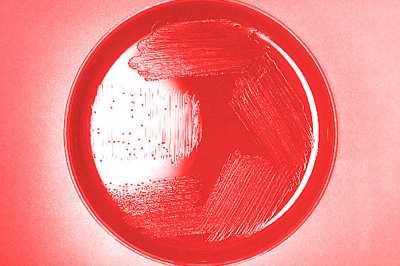AMD Project: Analyzing Leading Causes of Bacterial Meningitis
Using AMD methods to develop a one-step testing scheme
2017 Project Completion
This AMD project reached a successful completion in 2017. Through this work, investigators developed the Bacterial Meningitis Genome Analysis Platform (BMGAP), which analyzes Neisseria meningitidis and Haemophilus influenzae genomes with a one-step test. Scientists can now sequence all the genes from an isolate in just one week. BMGAP decodes DNA sequences to identify the bacterium causing the disease. It then uses these sequences to identify specific information, including bacterial subgroups, as well as genes that can trigger antibiotic resistance or may make current vaccines less effective.
From 2014 to 2016, CDC scientists used BMGAP to analyze thousands of bacterial meningitis genomes and investigate 15 outbreaks reported between 2009 and 2015 in the United States. These genomes were submitted by health departments and primarily collected through Active Bacterial Core surveillance. With BMGAP, scientists were able to monitor trends and changes in the DNA of meningitis bacteria affecting the U.S. population. For example, scientists monitored the proteins in bacteria that are included in the two new serogroup B meningococcal vaccines and how they change over time. BMGAP allowed researchers to compare and contrast N. meningitidis strains that cause disease to strains “carried” in the throats of healthy people who did not get sick. Together, outbreak investigations, surveillance, and carriage studies help CDC better understand the bacteria that cause meningitis and devise ways to control it.
BMGAP is a vital tool in understanding the bacteria that cause meningitis and CDC is working to make this tool available to state and international partners. By replacing time-consuming tests that only measure an individual gene at a time, BMGAP will help researchers worldwide address critical public health questions about bacterial meningitis.

AMD will improve disease surveillance and increase laboratory efficiency for identifying bacteria strains during meningitis outbreaks.
When bacterial meningitis strikes, it hits quickly and severely, with intense symptoms of headache, muscle aches, a stiff neck, and sometimes nausea and vomiting. While these symptoms can resemble a bad case of the flu, bacterial meningitis causes the membranes around the brain and spinal cord to swell. This can lead to serious and life-changing complications such as brain damage, hearing loss, or learning disabilities. Early diagnosis and immediate treatment are key to preventing further serious illness and death.
Vaccines are available for some strains of Neisseria meningitidis and Haemophilus influenzae, two of the main causes of bacterial meningitis in the United States. While these vaccines have prevented many from falling ill, some regions have seen an increase in disease caused by strains that aren’t covered by the vaccines. Even more concerning, both N. meningitidis and H. influenzae are able to receive genetic material (DNA) from other bacterial strains and add it to their own DNA, which allows them to become new strains, some of which can be resistant to antibiotics or no longer covered by available vaccines.
Presently, only a few tests are available to identify which bacterium caused someone’s meningitis. These tests are time-consuming, require multiple steps to complete, only provide limited information on the bacteria, and can sometimes miss uncommon or mutated strains. New testing methods are needed to identify the cause of bacterial meningitis sooner and track changes in the bacterial DNA.
Using advanced molecular detection (AMD) methods, researchers will be able to view all of the genetic material in the N. meningitidis and H. influenzae bacteria and identify even the smallest changes in genetic material using just one method, rather than the seven to ten currently used. Armed with this information, scientists will be able to quickly determine the strain of bacteria involved in a meningitis outbreak, know whether it is resistant to available antibiotics, and understand how the bacterial strain is different from other strains. In addition, the information from AMD methods will give researchers a better understanding of how the bacteria are changing in the community and the ability to track changes that cause vaccine and antibiotic resistance.
The information gathered through this project will transform current bacterial meningitis surveillance and improve case and outbreak detection. In addition, the diagnostic system created through this work can be expanded to other bacteria, leading to improved surveillance and outbreak response for a wide variety of diseases.
Download a print-only PDF fact sheet [2 pages]
PRINCIPAL INVESTIGATOR PROFILE

Xin Wang, PhD
Acting Chief, Meningitis Laboratory
Meningitis and Vaccine Preventable Diseases Branch
Division of Bacterial Diseases
National Center for Immunization and Respiratory Diseases
Xin Wang, PhD is the acting chief of the Meningitis Laboratory within the Division of Bacterial Diseases’ Meningitis and Vaccine Preventable Diseases Branch in CDC’s National Center for Immunization and Respiratory Diseases.
In this role, Wang serves as an expert on multiple subjects, including molecular diagnostics, molecular epidemiology, and genetic diversity of vaccine immunogens. She led the development of a breakthrough method for rapidly detecting bacterial pathogens that cause meningitis and threaten the lives of millions of people across Africa’s meningitis belt.
Wang is directing a whole genome sequencing study to identify genetic markers for strains of serogroup W Neisseria meningitidis that have caused epidemics in different parts of the world. By genetically comparing the serogroup W strains currently circulating in Africa to those known to cause outbreaks, scientists will be able to see if the African strains are a serious public health concern. She is also conducting a similar research study to see how different strains of these bacteria are genetically changing now that a serogroup A vaccine was successfully introduced in multiple African countries since 2010.
Wang is a graduate of Shandong University Department of Microbiology and earned her PhD from the Emory University Department of Microbiology and Immunology. In 2014, her contributions were recognized by receipt of the Excellence in Public Health Protection Award and a Special Act or Service Award for laboratory outbreak investigations from CDC’s National Center for Immunization and Respiratory Diseases. She has co-authored more than 40 scientific articles.
- Page last reviewed: June 20, 2017
- Page last updated: June 20, 2017
- Content source:


 ShareCompartir
ShareCompartir